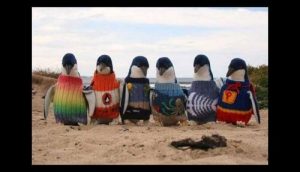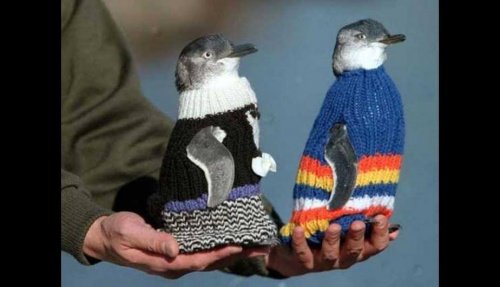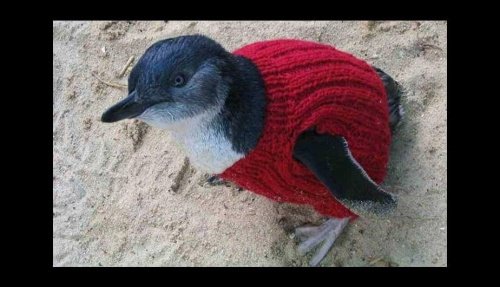109-Year-Old Man Knits Tiny Sweaters to Help Penguins


Written and verified by the lawyer Francisco María García
At 109 years old, Alfred Date is doing something extremely important. He is the oldest person in Australia, and is fully aware of the web-footed birds that were affected by the oil spill on Phillip Island. Alfred knows how to knit sweaters, and that is what he did to help the penguins.
A beautiful story

This story starts in 2013, when the Phillip Island’s Penguins Foundation was looking for volunteers to help these small animals who live in New Zealand and are sick because of the oil spill in the south of Australia.
Alfred decided to collaborate in the way that he knew best. He had learned to knit in 1932 by making a sweater for his newborn nephew. He saw the possibility of modifying his creations’ measurements and adapting them to the web-footed birds. With age, Alfred’s hands have been losing ability, but each piece of clothing came out perfectly.
The necessary coat for penguins
The moment that the penguins affected by the oil spill arrive at the foundation, they are given a coat so that the oil does not stick to their feathers. In 2001, the spill on Phillip Island had affected a total of 438 birds. A colony of more than 32,000 penguins usually live there. Thanks to the knitted clothes, around 97% of these birds were able to rehabilitate at the clinic.
More people in the initiative
Alfred Date, who has 7 children and 20 grandchildren, was not the only person to collaborate with this initiative. Hundreds of people around the world followed suit. The Phillip Island’s Penguins Foundation became overwhelmed by the amount of help. In May 2014, they had to ask volunteers to stop sending clothes, since the surplus was already huge.
As usual, everyone has different ideas and tastes. Some experts advised against this initiative, arguing that these pieces of clothing can cause the penguins a lot of stress. This is because they are wild animals that have not had any type of interaction with human beings.
They even said that the clothes made the oil stick to their skin more. On their part, the organization International Bird Rescue has confirmed that the last thing you should do is “put something on their feathers, because it makes the oil stick to their skin more. Penguins and other birds can warm up very quickly, and wearing clothes increases this risk.”
In spite of these conflicting opinions, the reality and data obtained in the project have proven the opposite with regards to the usefulness of these sweaters. They have saved many of these small animals’ lives.
At first everyone was very concerned for these almost 500 affected animals. It’s highly satisfying for the whole world to be able to say that practically all of their lives have been saved.
The damage of oil

Oil affects penguins by separating their feathers. When that happens, water can pass through their feathers and their body temperature goes down; this makes the animal very heavy. So then, it is difficult for them to hunt for their food, and they die of hunger. Furthermore, when cleaning themselves with their beak, they ingest all types of toxic substances.
The patterns of the sweaters have been made in such a way that does not damage the penguins’ plumage. And, it does not tangle their fins and beaks. The pieces of clothing are made of pure wool, such that the marine birds can keep warm without a risk of overheating. They can breathe well through that material.
Wool also helps absorb oil, so only a small amount of the toxic substances would reach the penguins’ skin.
Surplus of sweaters
The sweaters that are not needed for rehabilitation go to stuffed animal penguins. Then, they sell these for fundraising. The money raised will go to different research and conservation projects. This intelligent use of resources has generated an interesting profit that is being reinvested in new advances for helping animals that are most in need.
At 109 years old, Alfred Date is doing something extremely important. He is the oldest person in Australia, and is fully aware of the web-footed birds that were affected by the oil spill on Phillip Island. Alfred knows how to knit sweaters, and that is what he did to help the penguins.
A beautiful story

This story starts in 2013, when the Phillip Island’s Penguins Foundation was looking for volunteers to help these small animals who live in New Zealand and are sick because of the oil spill in the south of Australia.
Alfred decided to collaborate in the way that he knew best. He had learned to knit in 1932 by making a sweater for his newborn nephew. He saw the possibility of modifying his creations’ measurements and adapting them to the web-footed birds. With age, Alfred’s hands have been losing ability, but each piece of clothing came out perfectly.
The necessary coat for penguins
The moment that the penguins affected by the oil spill arrive at the foundation, they are given a coat so that the oil does not stick to their feathers. In 2001, the spill on Phillip Island had affected a total of 438 birds. A colony of more than 32,000 penguins usually live there. Thanks to the knitted clothes, around 97% of these birds were able to rehabilitate at the clinic.
More people in the initiative
Alfred Date, who has 7 children and 20 grandchildren, was not the only person to collaborate with this initiative. Hundreds of people around the world followed suit. The Phillip Island’s Penguins Foundation became overwhelmed by the amount of help. In May 2014, they had to ask volunteers to stop sending clothes, since the surplus was already huge.
As usual, everyone has different ideas and tastes. Some experts advised against this initiative, arguing that these pieces of clothing can cause the penguins a lot of stress. This is because they are wild animals that have not had any type of interaction with human beings.
They even said that the clothes made the oil stick to their skin more. On their part, the organization International Bird Rescue has confirmed that the last thing you should do is “put something on their feathers, because it makes the oil stick to their skin more. Penguins and other birds can warm up very quickly, and wearing clothes increases this risk.”
In spite of these conflicting opinions, the reality and data obtained in the project have proven the opposite with regards to the usefulness of these sweaters. They have saved many of these small animals’ lives.
At first everyone was very concerned for these almost 500 affected animals. It’s highly satisfying for the whole world to be able to say that practically all of their lives have been saved.
The damage of oil

Oil affects penguins by separating their feathers. When that happens, water can pass through their feathers and their body temperature goes down; this makes the animal very heavy. So then, it is difficult for them to hunt for their food, and they die of hunger. Furthermore, when cleaning themselves with their beak, they ingest all types of toxic substances.
The patterns of the sweaters have been made in such a way that does not damage the penguins’ plumage. And, it does not tangle their fins and beaks. The pieces of clothing are made of pure wool, such that the marine birds can keep warm without a risk of overheating. They can breathe well through that material.
Wool also helps absorb oil, so only a small amount of the toxic substances would reach the penguins’ skin.
Surplus of sweaters
The sweaters that are not needed for rehabilitation go to stuffed animal penguins. Then, they sell these for fundraising. The money raised will go to different research and conservation projects. This intelligent use of resources has generated an interesting profit that is being reinvested in new advances for helping animals that are most in need.
This text is provided for informational purposes only and does not replace consultation with a professional. If in doubt, consult your specialist.








